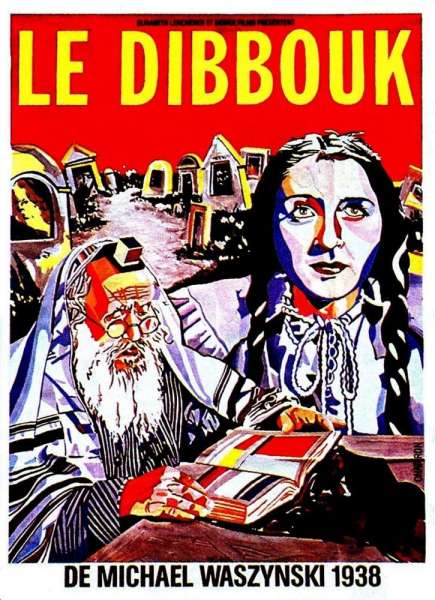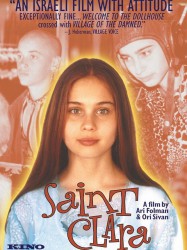Le Dibbouk est un film de genre Drame réalisé par Michał Waszyński avec Dina Halpern
Le Dibbouk (1937)

Si vous aimez ce film, faites-le savoir !
The Dybbuk (Yiddish: דער דיבוק, Der Dibbuk; Polish: Dybuk) is a 1937 Yiddish language Polish fantasy film drama directed by Michał Waszyński. It is based on the play The Dybbuk by S. Ansky.
The Dybbuk, or Between Two Worlds (Yiddish: דער דיבוק, אָדער צווישן צוויי וועלטן Der Dibbuk, oder Zwischen Zwei Welten) is a 1914 play by S. Ansky, relating the story of a young bride possessed by a dybbuk – a malicious possessing spirit, believed to be the dislocated soul of a dead person – on the eve of her wedding. The Dybbuk is considered a seminal play in the history of Jewish theatre, and played an important role in the development of Yiddish theatre and theatre in Israel. The play was based on years of research by Ansky, who traveled between Jewish shtetls in Russia and Ukraine, documenting folk beliefs and stories of the Hassidic Jews.
In 1937, the play, with some changes in the plot structure, was filmed by director Michał Waszyński in Warsaw, starring Lili Liliana as Leah, Leon Liebgold as Hannan (Channon, in the English-language subtitles), and Abraham Morewski as Rabbi Azrael ben Hodos. The film adds an additional act before those in the original play: it shows the close friendship of Sender and Nisn as young men. Besides the language of the film itself, the picture is noted among film historians for the striking scene of Leah's wedding, which is shot in the style of German Expressionism. The film is generally considered one of the finest in the Yiddish language. The Dybbuk was filmed on location in Kazimierz, Poland, and at the Falanga Film Studios in Warsaw.
Synopsis
L'histoire d'amour mystique entre Chonen, une pauvre étudiante du Talmud, et Lea, une fille d'une famille riche, dépeint la culture folklorique traditionnelle des Juifs polonais avant la Seconde Guerre mondiale.Acteurs

Dina Halpern
(Aunt Frade)
Commentaires
Postez un commentaire :
Suggestions de films similaires à Le Dibbouk
Il y a 0 films ayant les mêmes acteurs, 44 films avec le même réalisateur, 77275 ayant les mêmes genres cinématographiques (dont 13 ayant exactement les mêmes 5 genres que Le Dibbouk), 3314 films qui ont les mêmes thèmes (dont 920 films qui ont les mêmes 2 thèmes que Le Dibbouk), pour avoir au final 70 suggestions de films similaires.Si vous avez aimé Le Dibbouk, vous aimerez sûrement les films similaires suivants :

Saint Clara (1996)
, 1h25Réalisé par Ari Folman
Origine Israel
Genres Drame, Science-fiction, Comédie, Fantasy, Romance
Thèmes Religion, Religion juive
Acteurs Maya Maron, Yigal Naor, Orly Silbersatz Banai, Menashe Noy, Evgenia Dodina
Note68%





The film takes place in 1999 in a small Israeli town, in which a young girl called Clara (Lucy Dubinchik) discovers that she has paranormal powers that allow her to predict the future.

The Singing Forest (2003)
, 1h12Origine Etats-Unis
Genres Drame, Science-fiction, Fantasy, Romance
Thèmes Religion, Sexualité, Homosexualité, Politique, Religion juive, LGBT, LGBT
Acteurs Aage Winther-Jørgensen, Dustin Lance Black
Note21%





Christopher is a widower, his wife of 22 years having recently passed, and he begins drinking, he becomes obsessed with the theory of past lives. Before long, he is convinced he is actually the reincarnation of a German resistance fighter who was hanged by the Nazis for hiding Jews during The Holocaust. His situation becomes even more complex as his daughter, Destiny's, wedding approaches, and Christopher's sense of déjà vu around her fiancé, Ben, is enough to convince him that he and Ben were gay lovers during a past life. As Christopher becomes increasingly disturbed and goes about seducing his daughter's future husband, he begins to reveal the strange, violent path his life had taken well before his wife died.

Noé (2014)
, 2h8Réalisé par Darren Aronofsky
Origine Etats-Unis
Genres Drame, Science-fiction, Fantastique, Fantasy, Action, Aventure, Péplum
Thèmes La grossesse, La mer, Religion, Sexualité, Transport, Ange, La bible, Religion juive, Film catastrophe
Acteurs Russell Crowe, Jennifer Connelly, Douglas Booth, Logan Lerman, Emma Watson, Anthony Hopkins
Note57%





Sur une Terre minée par la violence généralisée (meurtres, débauches et vols), où Dieu annonce qu'il va détruire le monde, Noé est chargé par inspiration prophétique d'accomplir une mission cruciale : ériger une arche pour sauver sa famille et les animaux du cataclysme. Mais dégouté devant le spectacle de la déchéance humaine, qu'il croit inévitable pour les générations suivantes, Noé refuse d'être le nouvel Adam de l'humanité.

The Song (2014)
, 1h52Origine Etats-Unis
Genres Drame, Musical, Romance
Thèmes Religion, La bible, Religion juive
Acteurs Brad Leland
Note58%





Une adaptation moderne de la vie de Salomon et du Nouveau Testament.

Le chanteur de Jazz (1980)
, 1h55Réalisé par Richard Fleischer, Sidney J. Furie
Origine Etats-Unis
Genres Drame, Musical, Romance
Thèmes La musique, Religion, Théâtre, Musique, Religion juive, Adaptation d'une pièce de théâtre
Acteurs Laurence Olivier, Neil Diamond, Lucie Arnaz, Catlin Adams, Franklyn Ajaye, Paul Nicholas
Note59%





Yussel est chanteur le jour dans une synagogue; il se déguise en noir pour se produire la nuit sous le nom de Jess Robin dans les boîtes de jazz de Harlem. Sa formidable voix lui offre la possibilité de faire carrière mais son père, juif orthodoxe conservateur, estime que son don doit être uniquement réservé à Dieu et leur relation s'envenime.

Fantasia 2000 (2000)
, 1h15Réalisé par Eric Goldberg, James Algar, Don Hahn, Pixote Hunt, Hendel Butoy, Gaëtan et Paul Brizzi
Origine Etats-Unis
Genres Science-fiction, Fantasy, Musical, Animation
Thèmes Mise en scène d'un animal, La mer, La musique, Religion, Transport, Cétacé, Mise en scène d'un oiseau, Lié à la musique classique, Musique, La bible, Religion juive, Mise en scène d'un canard, Films pour enfants, Mise en scène d'un cétacé, Film catastrophe
Acteurs James Levine, Steve Martin, Quincy Jones, Bette Midler, Penn Jillette, James Earl Jones
Note70%





Cinquante-huit ans après Fantasia, ce film est composé de huit séquences illustrant huit morceaux de musique classique, interprétés pour la plupart par l'Orchestre symphonique de Chicago sous la direction de James Levine. Chaque séquence est précédée d'une courte présentation par des artistes ayant travaillé pour les studios Disney.

Le Chanteur de jazz (1953)
, 1h47Réalisé par Michael Curtiz
Origine Etats-Unis
Genres Drame, Musical, Romance
Thèmes La musique, Religion, Musique, Religion juive, Adaptation d'une pièce de théâtre
Acteurs Danny Thomas, Peggy Lee, Eduard Franz, Mildred Dunnock, Alex Gerry, Allyn Joslyn
Note57%





As Jerry Golding (a young Korean War veteran) scales the heights of show business, he breaks the heart of his father, who had hoped that Jerry would instead follow in the footsteps of six consecutive generations of cantors in their family. Sorrowfully, Cantor David Golding reads the Kaddish service, indicating that, so far as he is concerned, his son is dead. A tearful reconciliation occurs when Jerry dutifully returns to sing the "Kol Nidre" in his ailing father's absence.

Le Chanteur de jazz (1927)
, 1h30Réalisé par Alan Crosland, Gordon Hollingshead
Origine Etats-Unis
Genres Drame, Comédie dramatique, Musical, Romance
Thèmes La musique, Religion, Théâtre, Le jazz, Musique, Religion juive, Adaptation d'une pièce de théâtre
Acteurs Al Jolson, May McAvoy, Warner Oland, Eugenie Besserer, Myrna Loy, Otto Lederer
Note63%





Le chanteur Rabinowitz furieux a trouvé son fils Jakie en train de chanter dans un bar, et l’a chassé du foyer familial.

Simon Magus (1999)
, 1h41Réalisé par Ben Hopkins
Origine Royaume-uni
Genres Drame, Fantasy, Romance
Thèmes Religion, Religion juive
Acteurs Stuart Townsend, Rutger Hauer, Seán McGinley, Noah Taylor, Amanda Ryan, Ian Holm
Note68%





A Jew named Dovid Bendel (Stuart Townsend) tries to revive his dwindling village by building a railway station next to it. The squire (Rutger Hauer) agrees to provide the land, on the condition that Dovid will read his poetry. A cunning business man (Sean McGinley) is also interested in the land and he tries to compete using money and threats. The film is named for the village fool Simon (Noah Taylor), who is in turn named for the 1st century magician Simon Magus.

Jonas et les Végétaloufs (2002)
, 1h23Réalisé par Michael Nawrocki, Phil Vischer, Mike Nawrocki
Origine Etats-Unis
Genres Comédie, Fantasy, Action, Aventure, Musical, Animation, Romance
Thèmes La mer, Religion, Transport, Pirates, Musique, La bible, Religion juive
Acteurs Phil Vischer, Tim Hodge, Michael Nawrocki, Mike Nawrocki
Note63%





Alors que les Végétaloufs attendent une dépanneuse, des pirates leur racontent l'histoire d'une asperge en mission divine qui finit dans le ventre d'une baleine.
 Connexion
Connexion